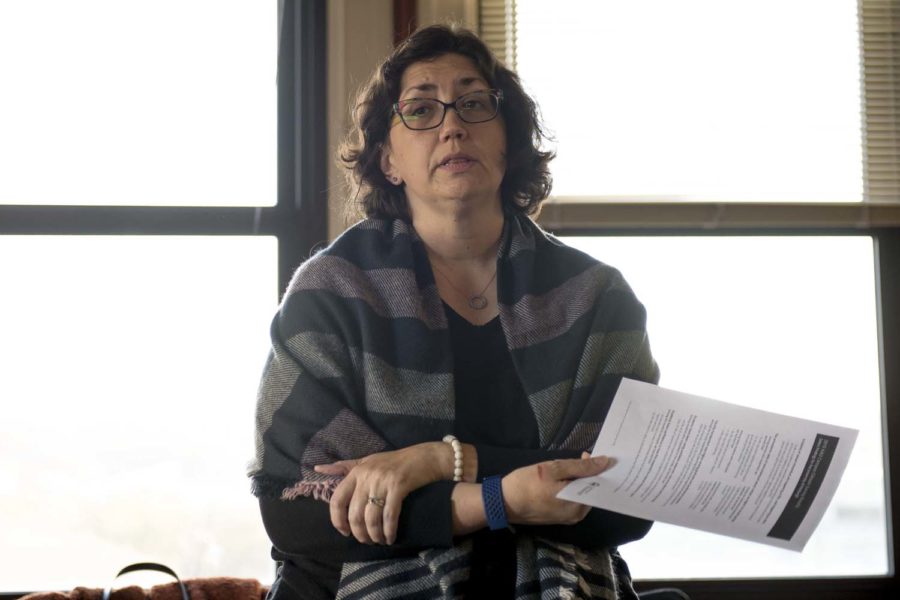Title IX holds town hall in wake of campus climate survey results
Katie Pope, the associate vice chancellor of Civil Rights and Title IX, speaks about the Association of American Universities Pitt campus climate survey at a town hall on Thursday afternoon.
November 15, 2019
Pitt is no exception to the sexual violence plight plaguing American universities today, according to a 2019 survey of the student body released in September. In response, the Office of Title IX said it plans to address the high numbers with new initiatives next semester.
Title IX coordinator Katie Pope discussed the results of the Association of American Universities Pitt campus climate survey during a town hall on Thursday, fielding questions from an audience of about 30 people about her office’s mission.
In September 2019, the AAU released the results for its Pitt campus climate survey. It found that 21.6% of women — undergraduate and graduate — reported experiencing sexual assault and 46.3% of black women on campus experienced sexual harassment. Additionally, 24% of female and 16.2% of male graduate students reported being harassed by a faculty member.
“What we’re doing now is we’re basically reevaluating everything we’ve done for the past four years,” Pope said. “Some of the initiatives like the Chancellor announced, like the Pitt Seed grant program and the student grant program, are to help us identify some more effective ways to communicate awareness to our campus community.”
One of the limitations of the survey released by the AAU, Pope said, was the fact that Westat, the independent research organization that conducted the survey, prevented the Office of Title IX from comparing 2019’s results with those of its last survey in 2015. Westat claims the questions from the 2015 survey are too different from the questions asked on the 2019 survey, so a comparison cannot be appropriately made. To address this limitation, the Office of Title IX plans to implement its own survey, relying on research experts to formulate the questions.
“The plan is to conduct an internal survey on a more frequent basis with different sets of questions and … created by experts in qualitative and quantitative research methods so that we don’t have to wait four years to see what things are working and what things aren’t, particularly as we’re hoping to increase prevention activities and efforts,” Pope said.
Pope said one of the more disappointing results of the study was that awareness about campus and Pittsburgh resources — such as the University Counseling Center and Pittsburgh Action Against Rape — for victims was low.
“Students are using resources on campus, but only about half the time,” Pope said. “Only 37.4% who contacted a program found it to be useful.”
To educate students and faculty about how to proceed when involved in or witnessing sexual assault or harrassment, the Office of Title IX plans to implement a new unit called the Focus Prevention Office in January, which would work in conjunction with the Office of Sexual Harassment and Assault Response and Education and Employee Relations.
“We are working with some excellent students to work on our peer-education program and to expand those types of tranings and educational opportunities so that we can better convey not just how to report but also how to address rape culture and sexual harrassment,” she said.
The need for such an office, Pope said, was reflected in the results of the AAU survey.
“The fact that we still have students who respond ‘No, I didn’t do anything,’ is a problem. If that number is still above one, then we’re not doing our job in terms of getting bystander intervention efforts out there. This new office would be centralizing this message and increasing the educational opportunities,” she said.
The Office of Diversity and Inclusion currently has 12 full-time staff members, and the Office of Title IX only employs six people — soon to be seven — but that doesn’t prevent it from investigating if the complainant wishes.
“We did 37 investigations last year. We do these investigations in part because we believe there’s a campus safety issue that needs to be addressed, but we also do them because the students, faculty and staff say ‘This person has violated University policy, and I want you to investigate.’ So we do,” Pope said.
Ms. Magazine published an article in 2017 written by a former Pitt professor in the department of communications who claimed the University had allowed a culture of sexual harassment and assault to fester within the department, describing it as “hostile to women and people of color.” Chancellor Patrick Gallagher, in his response, promised that the Office of Title IX would launch a full investigation into the matter.
During disclosures and investigations, Pope acknowledged the importance of a diverse faculty, in part so that complainants feel secure when disclosing sexual assaults and harassment.
“We recognize and we want to have a variety of folks available so that individuals feel comfortable. We realize that it’s sometimes because they want someone who looks like them, and also because they sometimes want someone who doesn’t look like them — we want to have that option available,” she said.
Besides concerns about diversity and awareness, a few members of the audience questioned the procedure for anonymous reports.
“It’s nearly impossible to investigate an anonymous report because to have an investigation you need to allow the person being accused an opportunity to respond, and if you don’t have a witness or complainant that’s concerned, then it’s hard to respond,” Pope said.
However, that doesn’t mean anonymous reports are not valued by the Office of Title IX, Pope said.
“An anonymous can give us additional information on something we already know about. There’s the possibility that an anonymous report will tell us a second incident in a certain location, or a second incident that has occurred in the same department or whomever it may be,” she said. “There are times when that is enough to help us move forward to take extra steps.”
A few students still had reservations about the Office of Title IX and its procedure for investigating reports. Summer Viscusi, a first-year psychology major, attended the conference to address some of the results of the survey and to learn more about how the Office of Title IX investigates reports.
“They need to be more clear about the policies they’re working on, especially how to help specific demographics when it comes to sexual assault,” she said.
Likewise, Abigail Lustig, a first-year microbiology major, wants the Office of Title IX to be more active on campus and more transparent about the resources it offers.
“There’s a lack of understanding as a freshman, going in here not knowing how to access the Title IX office. So, I’d like to be more informed as a freshman and wish it was more part of our orientation experience,” Lustig said.
Pope said there is no single solution to eradicating sexual violence and harrassment on campus, even though she wishes that were the case.
“This a big task and we all have to figure out where we fit in how to solve the problem,” Pope said. “We need to work on it together.”
Editor’s note: A previous version of this article incorrectly stated the percentage of female students at Pitt who experienced , both undergraduate and graduate, who reported a sexual assault in the Pitt campus climate survey. The article has since been updated to reflect the correct percentages. The Pitt News regrets this error.



